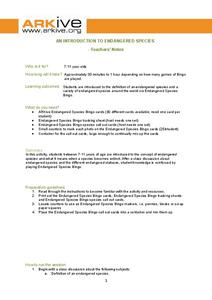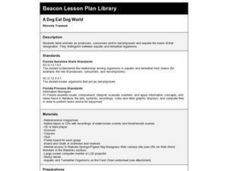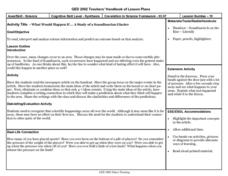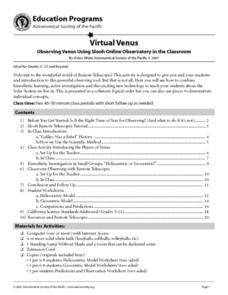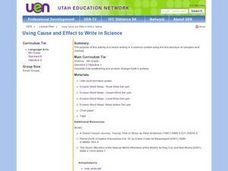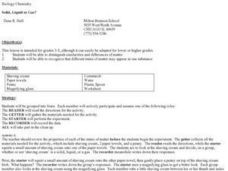Columbus City Schools
ABC: Acid Base Chemistry
Bubble, bubble, boil and trouble! What causes common substances like baking soda and vinegar to react the way they do? Welcome your junior chemists to the wonders of acid-base chemistry using a comprehensive and fun...
College Board
AP Physics 1 and 2 Inquiry-Based Lab Investigations
Have you ever wondered what type of AP Physics investigations The College Board wants? This is the guide for you! Sixteen labs covering both Physics I and II will get you started and inspire you to meet the requirement of 25 percent of...
Curated OER
I Wonder What Other Dangerous Diseases Insects Spread...
Middle schoolers use the internet to research diseases spread by insects. They create a brochure using the information they gathered. They present their project to the class.
Curated OER
Darwin’s Bees
What do you call a bee born in May? A maybe! This first instructional activity in a series of four begins with a starter activity to get scholars thinking about the topic. Then a circus, or circuit of seven activities,...
ARKive
An Introduction to Endangered Species
Playing games is a wonderful way to practice skills, start a discussion, or build memory. First, the class discusses extinction and conservation, and then they play a game of bingo. The game cards are printable and include images of...
Cornell University
Polymers: Making Silly Putty
Putty is proof that learning can be fun! Share the wonderful world of polymers with your class through an experiment. Young scientists create their own silly putty, then examine its properties.
Curated OER
Wild Wonderful Walk
Students explore the outdoors. In this poetry lesson, students spend time outdoors and write a poem about what they felt and saw. Students can do this activity in pairs or alone. Students blindfold their partner to focus on sounds and...
Curated OER
A Dog Eat Dog World
Fourth graders distinguish between acquatic and terrestrial organisms. They label animals as producers, consumers, and/or decomposers.
Curated OER
The Wonderful World of Polymers
Seventh graders investigate the concept of polymers. They discover unique properties and how polymers are natural. The lesson contains sufficient background information for the teacher. Students examine different types of materials and...
Curated OER
Meteor Showers
Students use the Internet to discover the wonderful world of comets and meteor showers. They discover how to spot one and predict them using a calendar. They also examine the makeup of meteoroids and meteorites.
Curated OER
Moon Snails
In this moon snails worksheet, students read a 2 page article on moon snails, define 8 vocabulary words relating to moon snails and answer 7 short answer questions relating to the article.
Curated OER
Have You Ever Wondered?
Students use their personal knowledge and the Internet to discover where and how spiders live. In groups, they discuss their experiences with spiders and how their lives differ from other insects. They use new vocabulary to discuss their...
Curated OER
OUT OF THIS WORLD AND INTO OUR CLASSROOM
Students create projects on Astronomy using math concepts and use of Internet resources.
Curated OER
What Would Happen If ... A Study of a Scandinavian Glacier
Students read an article about changes is the landforms in Scandinavia. They identify the main ideas. They eliminate or combine to make 4-7 main ideas. Finally students write about what they predict happen share, and discuss.
Curated OER
Owl Pellets: A Fowl-Up, Chuck!
Young scholars discover the world of owls as predators. After watching a video of owls hunting and eating, are introduced to owl pellets. Students dissect their own pellet and match the prey's bones to a bone diagram.
Curated OER
From Pirates to Pilots to Spies
Sixth graders enjoy this introduction to the world of map projections, globes, aerial photographs, and satellite images. This lesson instructs students on the advantages and disadvantages of each earthly representation.
Global Oneness Project
Learning with Nature
Think outside the box - and think about education beyond the classroom walls - with a resource that has your critical thinkers watching a video about a nursery in Scotland that lets youngsters roam wild in a forest....
Curated OER
Virtual Venus
Young scholars practice using the tool of remote telescopes in order to make observations in space. The lesson includes the best times of year to make observations. They use the internet to obtain information and to initiate the use of...
Curated OER
Going Batty
In this bats worksheet, students read 10 facts about bats. Students also choose the correct words from the box to complete the sentences.
Curated OER
Using Cause and Effect to Write in Science
Fifth graders brainstorm processes or forces that cause Earth's surface to be changed.
Curated OER
Building Bridges
Students identify the different types of bridges. Using the internet, they research information on how they are built by completing a scavenger hunt. Locating a specific area, they determine which type of bridge would be appropriate and...
Curated OER
Solid, Liquid, Or Gas?
Students identify physical characteristics and group objects for a picnic using the states of matter for each object and using literature to introduce the states of matter.
Curated OER
Biology: Plants - The Fiber of Life
Students, in groups, examine and list the varieties of plants and how they relate to man and the environment. They create plant books complete with leaf samples with sketches and information, grow beans in plastic baggies, and role-play...
Curated OER
The Water Cycle
Fourth graders explore changes in water forms. In this water cycle lesson, 4th graders build a water cycle model and monitor it for 2 weeks in order to understand that water changes state as it moves through the cycle.
Other popular searches
- Seven Wonders of the World
- 7 Wonders of the World
- 7 Wonders of the Ancient World
- The 7 Wonders of the World




